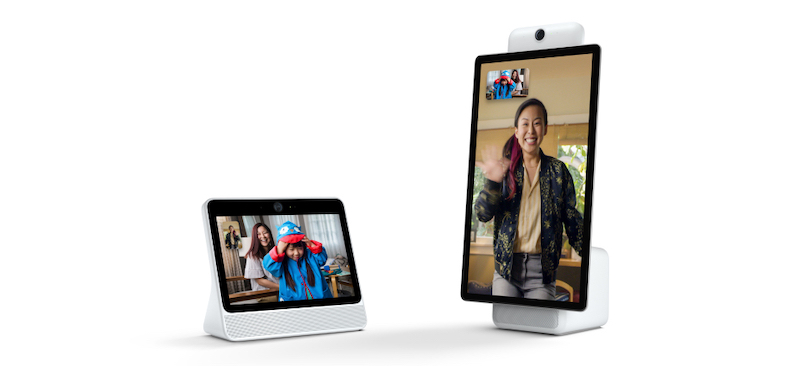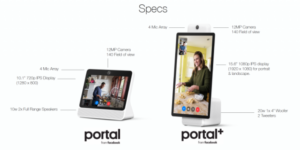In case you missed it, Facebook will be shipping in time for Christmas, a pair of new monitor devices ” Portal and Portal+ ” that look to open the video sharing experience beyond the small handheld screen (or clunky laptop.)

The solutions, intended for real-time video chat (FaceTime in Apple parlance), offer enhanced image zooming and tracking and AI functions available from Amazon’s Alexa. This is a countertop video chat device that use Facebook Messaging protocol (encryption) to create secured connections. But overall security for the social media giant is still at issue.
Facebook says its pair of Portal video displays offer advanced video chat and come with Alexa’s speaker AI functionality. There is a 10-inch Portal and 15.6-inch Portal+ (selling for $199 and $349 respectively) and including voice navigation (with “Hey Portal…” wake up.) Conveniently, they also offer Spotify or Pandora access for music streaming and planned video providers including Facebook Watch, and an API (application program interface) for third party development content providers soon to come. They even include smart photo / video frame mode for static and video photo viewing while in idle mode (the device is never off.)
And that may be just the problem. The timing of the product launch came just one day after Facebook announced a massive security breach that began in 2017 and continued until Sept of 2018. That breach affected up to 50 million users, including founder Mark Zuckerberg and other top management at the company, by exploiting flaws in “…Facebook’s code that impacted “View As”, a feature that lets people see what their own profile looks like to someone else. This allowed them to steal Facebook access tokens which they could then use to take over people’s accounts. Access tokens are the equivalent of digital keys that keep people logged in to Facebook so they don’t need to re-enter their password every time they use the app,” the company wrote on their .fb.security web site.
In a recent BBC article, Facebook’s product manager for Portal, Andrew Bosworth, (the executive responsible for the launch) told the BBC “We understand that inviting a camera and microphone into your home is the kind of thing that will give a consumer pause, especially for a new category of products around video calling that haven’t been really common for consumers to have access to,” he said, concluding that security for the new devices began two years ago with a “privacy plan.”
 Facebook’s new Portal pair Video Chat Speakers selling for $99 and $349 respectively, source: Facebook, via BBC
Facebook’s new Portal pair Video Chat Speakers selling for $99 and $349 respectively, source: Facebook, via BBC
Facebook Portal Portal Specs, source Facebook via TechCrunch.com
We have seen evidence of Facebook’s push into video space as far back as February 2018. Then, mobile video traffic cop Openwave Movility, published its Mobile Video Index (MVI) report, stating that “…while YouTube remains the most popular for mobile video, Facebook is rapidly closing the gap in some markets and has even overtaken YouTube in others.” The group aggregates traffic data from live video deployments using the top 30 mobile operators world wide. See link to this story below.
So get ready for the next stage in AI in you kitchen, where the convenience of a connected assistant can be hard to beat. Now add the interface of video chat and motion tracking to FaceTime calls and words like compelling come to mind. As always, the prospect of some “thing” listening in on personal conversations seems a bit sketchy (creepy) but that may give way to tolerance as the high tech convenience factor continues to multiply. OK, put this on my Christmas wish list, but be ready to disconnect the battery at a moment’s notice. – Stephen Sechrist
Facebook Launches Portal Range of Video Calling Hardware
Facebook Is Hiring More Augmented Reality Chip Engineers
Mobile Video Index: Facebook Video is Poised to Overtake YouTube

